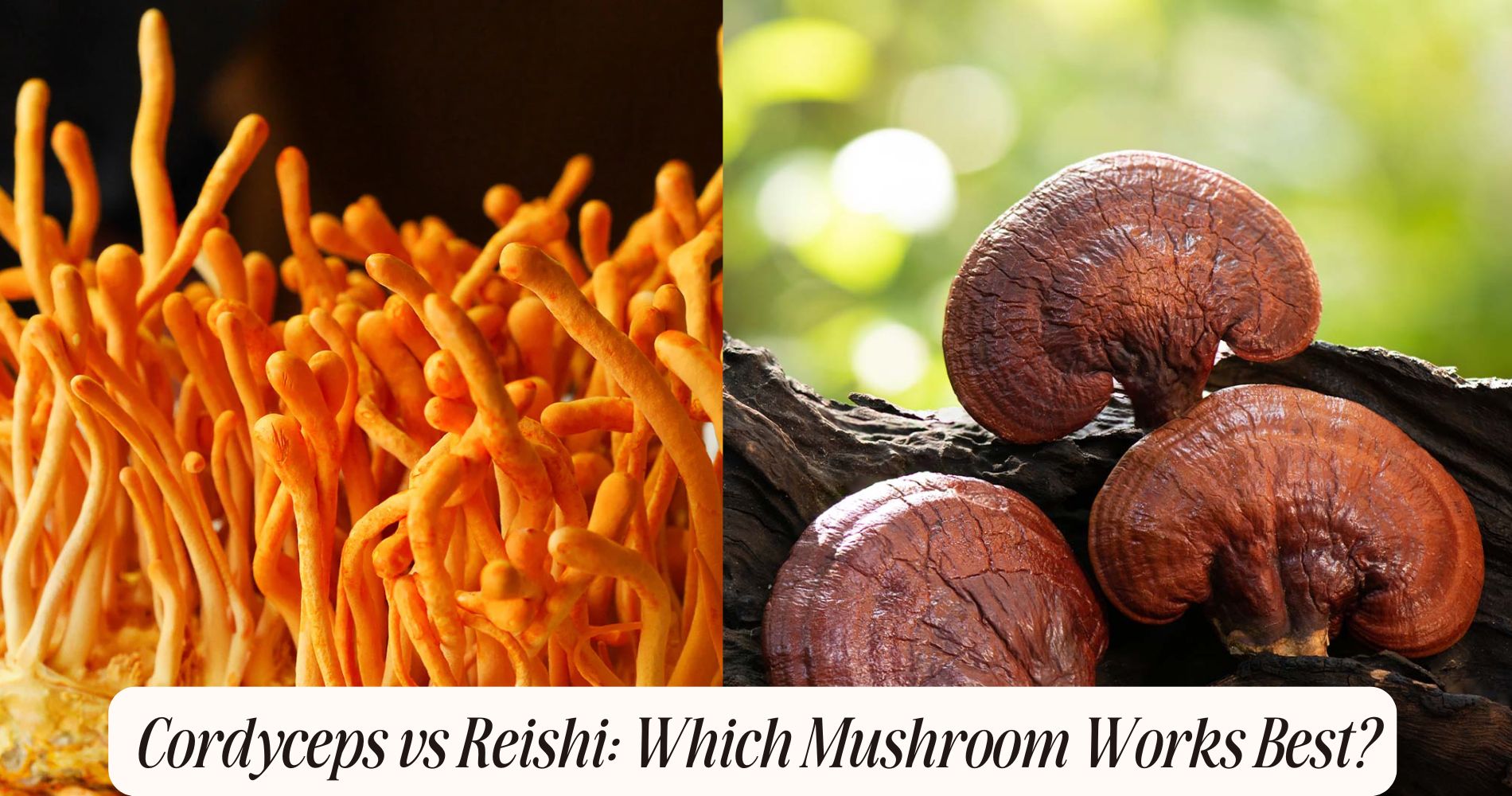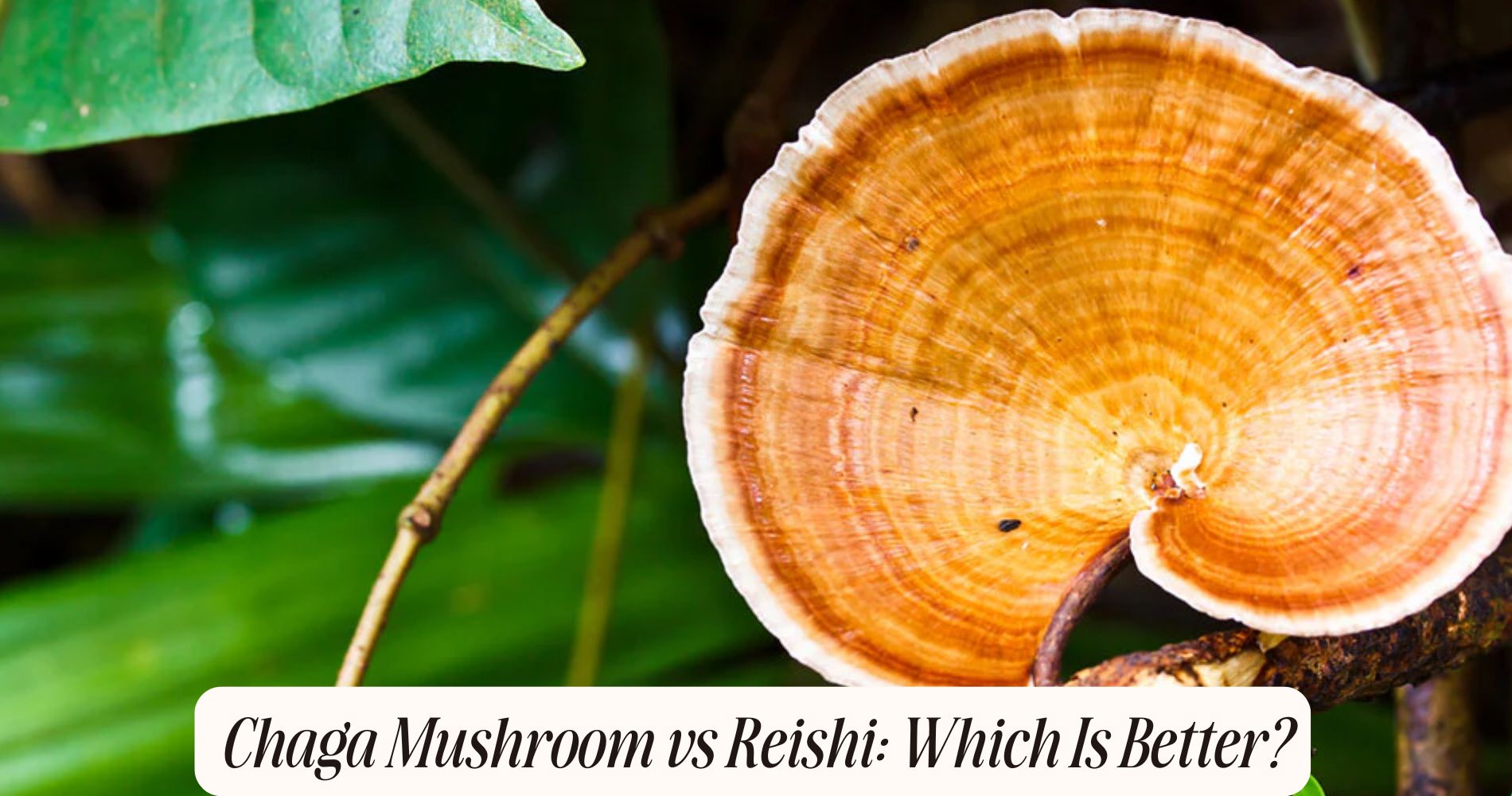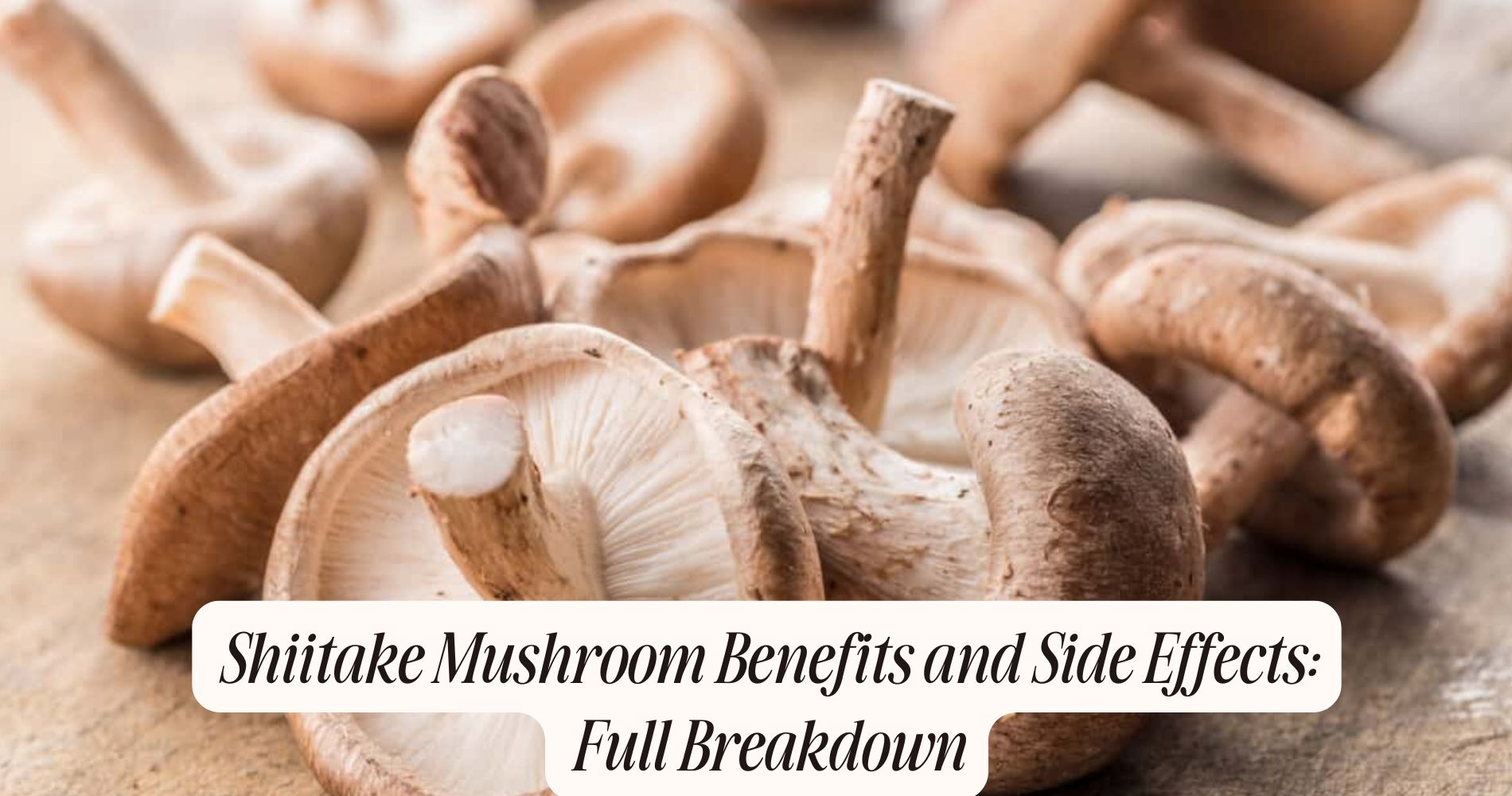
Cordyceps vs Reishi: Which Mushroom Works Best?
When deciding between Cordyceps and Reishi mushrooms, consider your health goals. Cordyceps excels in enhancing athletic performance, boosting energy levels, and improving oxygen utilization. It also supports metabolic health and strengthens immune function. In contrast, Reishi, acclaimed for its calming properties, is perfect for stress reduction and immune support. It promotes restful sleep and aids in managing inflammation. Your choice hinges on whether you prioritize energy and performance or tranquility and immune resilience. Exploring their specific benefits further can help you tailor your choice to best suit your individual needs.
Overview of Cordyceps
Cordyceps, a fascinating genus of parasitic fungi, has garnered significant attention for its unique life cycle and potential health benefits. You'll find that Cordyceps species mainly thrive in high-altitude environments, where they infect insect hosts and eventually replace their tissues. This parasitic relationship is essential for their reproduction, as they produce fruiting bodies that emerge from the host, releasing spores to continue the cycle.
In recent years, Cordyceps cultivation has gained popularity due to the increasing demand for these fungi in dietary supplements and traditional medicine. While wild-harvested Cordyceps, such as Cordyceps sinensis, are highly valued, their scarcity and high price have prompted significant interest in cultivated alternatives.

You can find various species, including Cordyceps militaris, which is often cultivated on substrates like grains or insect larvae.
The cultivation process involves controlled conditions to optimize growth, emphasizing factors such as temperature, humidity, and nutrient availability. Understanding these parameters can enhance yield and quality.
As you explore Cordyceps, consider the implications of its cultivation on sustainability and the potential for broader applications in health and wellness.
Overview of Reishi
Reishi, often referred to as the "mushroom of immortality," offers a range of health benefits that have been recognized in traditional medicine for centuries.
You'll find that its nutritional profile contains bioactive compounds, such as triterpenes and polysaccharides, which contribute to its therapeutic properties.
Understanding its traditional uses and practices can provide valuable insights into its role in promoting overall wellness.
Health Benefits of Reishi
Known for its unique appearance and potent medicinal properties, Reishi mushroom (Ganoderma lucidum) has been a cornerstone of traditional Chinese medicine for centuries.
Recent scientific research has validated many of its purported health benefits, making it a focus of modern herbal studies. One of the primary benefits of Reishi is its immunomodulatory effects; it helps balance the immune system, enhancing your body's ability to fend off infections while potentially reducing autoimmune responses.
Additionally, Reishi is recognized for its adaptogenic properties, which may help your body cope with stress more effectively.
Studies suggest that compounds like triterpenoids and polysaccharides, extracted using various reishi extraction methods, contribute to these beneficial effects.
Moreover, ongoing research into Reishi cultivation techniques aims to improve the quality and effectiveness of Reishi products.
By optimizing growth conditions, cultivators can enhance the concentration of bioactive compounds, making the mushroom even more beneficial.
Traditional Uses and Practices
Rooted in centuries of tradition, the use of Reishi mushroom in various cultures showcases its importance beyond just modern health trends. Known as "Lingzhi" in China, Reishi has been a cornerstone of traditional medicine, revered for its purported therapeutic properties. Historically, it was reserved for emperors and the elite, symbolizing longevity and health. This cultural significance continues to influence its status in contemporary wellness circles.

In traditional practices, Reishi is often utilized to enhance overall energy and support immune function. Its adaptogenic qualities have made it a staple in herbal formulations, believed to help the body adapt to stress and restore balance. Various cultures have prepared it in teas, tinctures, or powdered forms, emphasizing its role in holistic health.
Scientific scrutiny of Reishi's traditional uses reveals compounds like triterpenes and polysaccharides, which contribute to its health-promoting effects. While anecdotal evidence abounds concerning its benefits, ongoing research continues to validate its place in traditional medicine.
Nutritional Profile Overview
When exploring the Reishi mushroom's nutritional profile, you'll find it rich in bioactive compounds that contribute to its health benefits. Reishi's vitamin content includes important vitamins such as B vitamins (B1, B2, B3, B5, and B12), which play significant roles in energy metabolism and cognitive function.
Additionally, it contains vitamin D, known for its role in bone health and immune support.
The mineral profile of Reishi is equally impressive. You'll discover significant amounts of minerals like potassium, magnesium, calcium, and zinc.
Potassium is essential for maintaining electrolyte balance and heart function, while magnesium supports muscle and nerve function. Calcium contributes to bone strength, and zinc plays a key role in immune function and wound healing.
Moreover, Reishi is abundant in polysaccharides, triterpenes, and other phytochemicals, which are linked to anti-inflammatory and antioxidant effects.
These compounds work synergistically to enhance overall health and wellness. Understanding Reishi's nutritional profile helps you appreciate its potential as a functional food, but it's important to take into account individual health conditions and consult healthcare professionals when incorporating it into your diet.
Health Benefits of Cordyceps
Cordyceps, a unique genus of fungi, offers a range of health benefits that are increasingly being recognized in both traditional and modern medicine.
One of the most notable advantages is its potential to enhance athletic performance. Studies have shown that Cordyceps supplementation can improve oxygen utilization and increase ATP production, which may lead to enhanced endurance and reduced fatigue during physical activities.

Additionally, Cordyceps research suggests that these fungi possess anti-inflammatory and antioxidant properties. These attributes can help combat oxidative stress and inflammation, which are linked to various chronic diseases.
Moreover, Cordyceps may support immune function, promoting overall health and resilience against infections.
Another area of interest is Cordyceps' potential role in blood sugar regulation. Some studies indicate that it may improve insulin sensitivity and aid in glucose metabolism, making it a candidate for managing diabetes.
Health Benefits of Reishi
Reishi, often referred to as the "mushroom of immortality," consistently garners attention for its extensive health benefits. This mushroom is rich in bioactive compounds, including triterpenes and polysaccharides, which contribute to its therapeutic effects.
Research shows that reishi can enhance immune function, acting as an immunomodulator. By influencing immune cell activity, it helps your body fight infections and potentially reduces the risk of chronic diseases.
Moreover, reishi has been studied for its anti-inflammatory properties. By inhibiting pro-inflammatory cytokines, it may mitigate conditions linked to chronic inflammation, such as arthritis.
Additionally, its adaptogenic qualities can help you manage stress and promote overall mental well-being, making it a valuable ally in today's fast-paced world.

When considering reishi dosage, studies typically suggest a range between 1 to 3 grams of dried reishi extract daily, depending on the extraction method used.
Reishi extraction techniques, like hot water or alcohol extraction, can greatly influence the bioavailability of its beneficial compounds. Understanding these factors can help you maximize the health benefits of reishi, ensuring you're getting the most from this remarkable mushroom.
Energy and Performance Enhancement
For those seeking to boost energy and enhance performance, cordyceps emerges as a compelling option. This mushroom has garnered attention for its potential to act as a natural performance booster, particularly among athletes and fitness enthusiasts.
Research indicates that cordyceps can increase ATP production, the primary energy carrier in cells, which directly impacts your energy levels during physical activity.
Studies have shown that supplementation with cordyceps can improve oxygen utilization and endurance, enabling you to train harder and longer. This is especially important for high-intensity workouts where endurance and stamina play essential roles.
In addition, cordyceps may enhance aerobic capacity, allowing you to perform better in endurance sports.
While reishi is often celebrated for its immune-supportive properties, it doesn't exhibit the same level of energy-enhancing effects as cordyceps.
If your goal is to elevate your physical performance and maintain high energy levels throughout the day, cordyceps could be your best bet.
Incorporating cordyceps into your routine may provide the edge you need to achieve your fitness goals and optimize your performance.
Immune System Support
Supporting your immune system is essential for overall health, and reishi mushroom stands out as a powerful ally in this regard. Known scientifically as Ganoderma lucidum, reishi has been extensively studied for its immune-boosting properties. It contains bioactive compounds like triterpenes and polysaccharides that actively enhance immune function.
Research shows that reishi can stimulate the production of immune cells, such as macrophages and natural killer cells, which play critical roles in your body's defense mechanisms. This immune modulation is particularly beneficial for individuals facing chronic stress or illness, as it helps your body adapt to varying immune demands.

While both reishi and cordyceps offer immune support, reishi's ability to provide a balanced response—boosting when necessary and calming an overactive immune response—is significant. This quality makes it an excellent choice for maintaining immune homeostasis.
Integrating reishi into your routine could help you achieve ideal immune health. Whether through supplements or teas, you can harness the power of reishi to fortify your immune system against pathogens and promote overall well-being.
Potential Side Effects
When considering Cordyceps and Reishi, it's essential to be aware of potential side effects.
You might experience common side effects like gastrointestinal discomfort, and there's also a risk of allergic reactions in sensitive individuals.
Additionally, both fungi can interact with certain medications, so it's important to consult a healthcare professional before incorporating them into your regimen.
Common Side Effects
Cordyceps and reishi mushrooms are both celebrated for their health benefits, but they can also cause side effects that users should be aware of. While generally considered safe for most individuals, some common side effects include gastrointestinal discomfort, diarrhea, and nausea.
Additionally, users might experience headaches or dizziness, particularly if they exceed recommended dosage guidelines.
To minimize these risks, it's important to adhere to safety precautions and dosage guidelines. For instance, starting with a lower dose and gradually increasing it allows your body to adjust without overwhelming it.
Regular monitoring of your body's response can help identify any adverse reactions early on.
For those with underlying health issues, such as diabetes or autoimmune disorders, it's vital to consult a healthcare professional before incorporating these mushrooms into your regimen. This can help prevent potential interactions with medications or exacerbate existing conditions.
Allergic Reactions Risk
Experiencing allergic reactions is a potential risk when consuming both cordyceps and reishi mushrooms, particularly for individuals with sensitivities to fungi.
Mushroom allergies can manifest in various ways, and it's important to recognize the allergic symptoms that may arise. These can include skin reactions like hives, gastrointestinal distress, and respiratory issues.
The reaction typically stems from proteins found in the mushrooms, which your immune system may mistakenly identify as harmful. If you have a history of allergic reactions to other fungi, it's vital to proceed with caution.
Reishi, known for its immune-modulating properties, can sometimes exacerbate allergic symptoms in sensitive individuals. Similarly, while cordyceps is generally well-tolerated, some users report mild allergic reactions.
Before incorporating either mushroom into your regimen, consider consulting a healthcare professional, especially if you have a known mushroom allergy.
Monitoring your body's response after initial consumption can also help you identify any adverse reactions. Taking these precautions guarantees you can enjoy the potential benefits of cordyceps and reishi while minimizing the risk of allergic reactions.
Drug Interaction Concerns
Drug interactions can pose significant concerns for individuals contemplating the incorporation of cordyceps or reishi into their health regimen. Both mushrooms have therapeutic properties, but they can also interact with various medications, leading to potential safety concerns.
For instance, cordyceps may enhance the effects of anticoagulants, increasing the risk of bleeding. If you're taking blood thinners, this interaction could be particularly dangerous.
On the other hand, reishi is known to influence the metabolism of certain medications, including those processed by the liver. This alteration can either amplify or diminish the effectiveness of your prescribed drugs, potentially leading to suboptimal therapeutic outcomes.
If you're on medication for chronic conditions, this is vital to take into account.
Additionally, both mushrooms possess immunomodulatory effects, which could interfere with immunosuppressive therapies. If you're undergoing treatment for autoimmune diseases or organ transplants, the interaction could compromise your health status.
Therefore, it's important to consult a healthcare professional before adding cordyceps or reishi to your routine, particularly if you're on medication. Understanding these drug interactions can help you make informed decisions about your health and avoid unwanted side effects.
Recommended Uses and Dosage
When considering the recommended uses and dosages for Cordyceps and Reishi mushrooms, it's vital to understand their distinct benefits.
Cordyceps is often recommended for enhancing athletic performance, boosting energy levels, and improving oxygen utilization. The ideal use for Cordyceps typically ranges from 1,000 to 3,000 mg per day, depending on your individual goals and tolerance. This dosage can be taken in divided amounts throughout the day to maintain steady energy levels.
On the other hand, Reishi is known for its calming properties and immune support. It's commonly recommended for reducing stress, improving sleep quality, and supporting overall wellness. For Reishi, the recommended dosage usually falls between 1,500 to 5,000 mg per day. Again, you might want to split this dosage into two or three servings to maximize its adaptogenic effects.
Both mushrooms can be taken in various forms, including powders, capsules, or teas, allowing you to choose what fits your lifestyle best.
Always consult with a healthcare professional before starting any new supplement to guarantee you're using them effectively and safely based on your unique health profile.
Choosing the Right Mushroom
Choosing the right mushroom for your health goals requires a careful evaluation of your specific needs and preferences. Cordyceps and Reishi mushrooms offer different benefits that cater to various health objectives.
If you're aiming to enhance athletic performance, boost energy levels, or improve respiratory function, Cordyceps may be your best choice. This mushroom is known for its ability to increase ATP production, leading to improved endurance and stamina.

On the other hand, if your focus is on stress reduction, immune support, or promoting restful sleep, Reishi might be more suitable. This mushroom is recognized for its adaptogenic properties, helping your body manage stress and supporting overall well-being.
When it comes to mushroom selection, consider factors like your lifestyle, potential allergies, and any existing health conditions. Conduct thorough research on the specific compounds found in each mushroom and how they align with your health goals.
Additionally, consult with a healthcare professional to guarantee safety and efficacy. Ultimately, your choice between Cordyceps and Reishi should reflect your personal health objectives, allowing you to harness the unique benefits each mushroom has to offer.
Frequently Asked Questions
Can Cordyceps and Reishi Be Taken Together Safely?
Yes, you can safely take cordyceps and reishi together. Their benefits can create a synergistic effect. However, consult a healthcare professional for dosage recommendations to guarantee ideal results and avoid potential interactions.
How Do Cordyceps and Reishi Compare in Taste?
When comparing flavor profiles, cordyceps has a mild, earthy taste, while reishi offers a slightly bitter, woody flavor. Both mushrooms find culinary uses in soups and teas, enhancing nutrition without overpowering other ingredients.
What Forms Do Cordyceps and Reishi Come In?
Cordyceps and reishi come in various forms, including capsule forms and powdered extracts. Their medicinal uses vary based on cultivation methods. You'll find these options beneficial for incorporating them into your health regimen effectively.
Are There Specific Brands of Cordyceps and Reishi Recommended?
When evaluating specific brands of cordyceps and reishi, consider their sourcing and brand effectiveness. Research third-party testing and customer reviews to guarantee you're choosing high-quality products that deliver the promised benefits effectively.
How Long Does It Take to See Results From These Mushrooms?
You'll notice expected benefits from these mushrooms within a few weeks, but individual differences can impact results. Factors like dosage, health status, and lifestyle will influence how quickly you experience noticeable effects.
Conclusion
To summarize, both Cordyceps and Reishi mushrooms offer unique health benefits, catering to different needs. Cordyceps excels in energy enhancement and athletic performance, while Reishi stands out for its immune support and stress reduction properties. Your choice depends on your specific health goals. If you're seeking energy and endurance, Cordyceps might be your best bet. Conversely, if you're focused on bolstering your immune system and promoting relaxation, Reishi could be the ideal option. Always consult a healthcare professional before starting any supplement.




